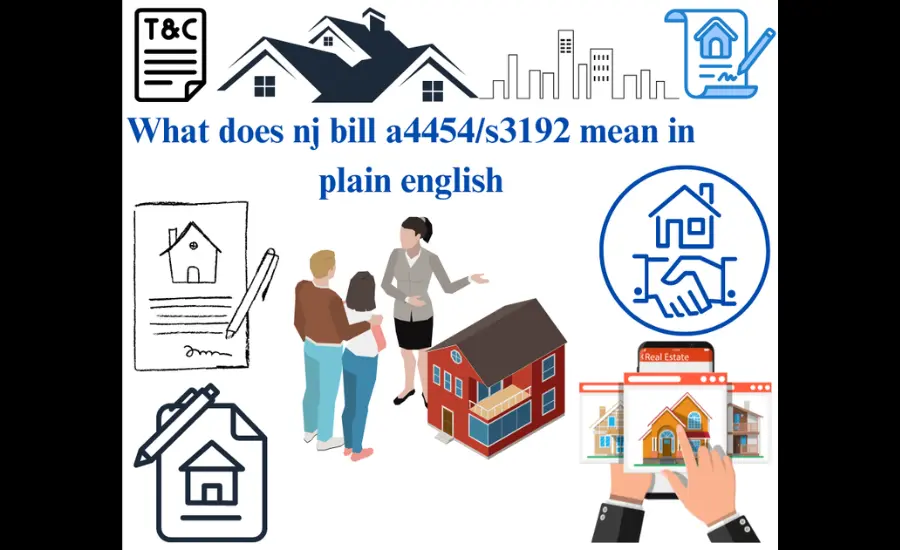In the rapidly evolving landscape of real estate, legislative changes can have profound effects on the property market, impacting buyers, sellers, and developers alike. One such recent change in New Jersey is the introduction of Bill A4454/S3192. This bill, introduced by the state legislature, seeks to address various aspects of the real estate sector, from tenant protections to zoning regulations, and has garnered significant attention due to its potential to reshape the state’s property market.
In this article, we will break down Bill A4454/S3192 into plain English to help you understand its key provisions and implications. We’ll explore how the bill aims to impact New Jersey’s real estate market and the long-term effects it may have on stakeholders, from homeowners and renters to developers and investors.
Understanding the Context of Bill A4454/S3192
Before diving into the specifics of the bill, it’s essential to understand the broader context that prompted its creation. Over the past few years, New Jersey has seen shifts in its real estate market, influenced by rising home prices, increased demand for rental housing, and ongoing debates about affordable housing. As in many parts of the country, these pressures have led to a greater focus on tenant rights and housing affordability, sparking interest in reform at the state level.
Bill A4454/S3192 was developed as part of an effort to address these issues, with lawmakers aiming to strike a balance between protecting tenants, encouraging development, and ensuring long-term housing stability in the state.
Key Provisions of Bill A4454/S3192
Now, let’s break down the core elements of Bill A4454/S3192 to better understand its goals and how it may impact the real estate market in New Jersey.
1. Tenant Protection and Rental Market Regulation
One of the most significant aspects of Bill A4454/S3192 is its focus on tenant protection. With rising rents and housing insecurity becoming more prevalent, the bill includes provisions designed to shield renters from unfair treatment and ensure they have greater security in their homes.
- Caps on Rent Increases: The bill sets limits on the percentage by which landlords can raise rent annually. This aims to prevent sudden, significant rent hikes that could displace tenants or make housing unaffordable for lower-income residents.
- Stronger Eviction Protections: Under the new law, tenants have more protections against eviction. Landlords must provide valid reasons for terminating a lease, and tenants are given more time to respond to eviction notices.
- Tenant-Right-to-Counsel Programs: To further bolster tenant rights, the bill introduces tenant-right-to-counsel programs, providing legal assistance to renters who may face eviction. This provision seeks to level the playing field in disputes between landlords and tenants.
These changes have garnered mixed reactions. Proponents argue that these measures will create a more stable rental market, particularly for vulnerable populations. Critics, on the other hand, worry that restrictions on rent increases could discourage new developments or lead to higher rents in the long run as landlords attempt to recoup potential losses.
2. Zoning Reforms and Development Incentives
Another major component of the bill deals with zoning laws and development incentives. Lawmakers recognize that the current regulatory framework can be cumbersome, often making it difficult for developers to build new housing or commercial properties. Bill A4454/S3192 aims to streamline this process and encourage development, particularly in areas where housing shortages are most acute.
- Expedited Zoning Approvals: The bill establishes a framework for expedited zoning approvals, allowing developers to move more quickly through the often lengthy and bureaucratic process. This is expected to lead to faster project completion, particularly for affordable housing developments.
- Incentives for Affordable Housing: In line with the goal of addressing the housing crisis, Bill A4454/S3192 includes tax incentives and other benefits for developers who commit to building affordable housing units. By making it more financially viable to construct affordable homes, the state hopes to increase the supply of housing accessible to low- and middle-income families.
These zoning and development reforms could significantly boost construction in New Jersey, particularly in high-demand areas. However, the success of these provisions will depend on how they are implemented and whether developers take advantage of the new incentives.
3. Environmental and Sustainability Regulations
Recognizing the need for sustainable development, Bill A4454/S3192 introduces several provisions aimed at promoting environmentally responsible real estate practices. As part of a broader effort to combat climate change and reduce New Jersey’s carbon footprint, the bill encourages developers to incorporate green building practices into their projects.
- Energy Efficiency Standards: New construction and major renovations must meet certain energy efficiency standards. This could include the use of renewable energy sources, energy-efficient windows and insulation, and other eco-friendly materials.
- Green Spaces and Urban Planning: Developers are incentivized to include green spaces and sustainable urban planning features, such as parks and community gardens, in their projects. These elements are designed to enhance quality of life for residents while also reducing the environmental impact of new developments.
These environmental regulations reflect New Jersey’s broader commitment to sustainability, but they may also raise costs for developers. Ensuring that projects remain financially viable while adhering to these new standards could be a challenge for some, particularly smaller developers.
Potential Impacts on Stakeholders
As with any major legislative change, the effects of Bill A4454/S3192 will be felt across multiple sectors, from individual homeowners and renters to real estate professionals and developers. Let’s explore how different stakeholders may be impacted by the new law.
1. Homeowners and Property Sellers
For homeowners and those looking to sell property in New Jersey, Bill A4454/S3192 could bring both opportunities and challenges. On one hand, the bill’s emphasis on promoting development, particularly affordable housing, could help stabilize property values in areas where housing shortages have driven prices up rapidly. More housing supply could ease pressure on the market, making it easier for buyers to find homes and for sellers to set reasonable prices.
On the other hand, homeowners who rely on rental income may face new challenges under the bill’s tenant protection provisions. With caps on rent increases and stricter eviction regulations, landlords may find it more difficult to maximize their rental profits. This could disincentivize some homeowners from renting out properties or lead them to explore alternative investment strategies.
2. Renters and Tenants
For renters, Bill A4454/S3192 is largely seen as a win. The bill’s tenant protection measures, including limits on rent increases and enhanced eviction protections, provide greater stability and security for renters. This is particularly important in high-demand areas where rents have been rising rapidly, pricing many individuals and families out of the market.
Additionally, the introduction of tenant-right-to-counsel programs is expected to help level the playing field between renters and landlords, particularly in eviction cases. Having access to legal assistance can make a significant difference for tenants who may otherwise be vulnerable to eviction due to lack of representation.
3. Real Estate Developers and Investors
The effects of Bill A4454/S3192 on developers and investors are somewhat more complex. On the one hand, the bill’s zoning reforms and development incentives could create new opportunities for real estate professionals. By streamlining the approval process and offering financial benefits for affordable housing projects, the state is actively encouraging new development, which could lead to increased investment and construction activity.
However, developers must also contend with the bill’s environmental regulations, which may increase costs for certain projects. Balancing the need for energy efficiency and sustainability with profitability will be a key challenge moving forward. Additionally, some developers may be wary of the tenant protection measures, particularly if they believe these provisions will make it more difficult to manage rental properties profitably.
Broader Economic and Social Implications
Beyond the immediate impacts on real estate stakeholders, Bill A4454/S3192 also has broader economic and social implications for New Jersey. The bill’s focus on affordable housing and tenant protection speaks to larger concerns about housing inequality and economic stability in the state.
By making housing more accessible and affordable, particularly for low- and middle-income families, the bill could help reduce homelessness and housing insecurity in New Jersey. In the long term, this could lead to more stable communities and a healthier state economy, as individuals and families are better able to find and maintain stable housing.
At the same time, the bill’s environmental regulations align with New Jersey’s broader commitment to sustainability and climate action. As the state continues to combat the effects of climate change, promoting green building practices and energy efficiency in the real estate sector will be critical.
Challenges and Controversies Surrounding the Bill
As with any major piece of legislation, Bill A4454/S3192 has not been without its controversies. While many applaud the bill’s efforts to protect tenants and promote affordable housing, others have raised concerns about its potential unintended consequences.
1. Impact on the Rental Market
One of the most significant points of contention is the bill’s impact on the rental market. Critics argue that the rent control provisions could discourage landlords from maintaining or investing in rental properties, particularly if they believe they will be unable to raise rents to cover rising costs. This could lead to a reduction in the overall quality of rental housing or even a decrease in the number of rental properties available.
2. Development Incentives vs. Local Control
Another area of debate is the balance between state-level development incentives and local control over zoning and planning decisions. While the bill’s expedited zoning approvals are intended to streamline the process and encourage development, some local officials worry that this could lead to a loss of control over how their communities are shaped.
The Future of Real Estate in New Jersey
As Bill A4454/S3192 continues to be implemented, it’s clear that the legislation will have far-reaching effects on the real estate market in New Jersey. The bill’s focus on tenant protection, affordable housing, and sustainability represents a significant shift in how the state approaches real estate regulation, and its long-term impacts will likely be felt for years to come.
For real estate professionals, developers, and investors, staying informed about the bill’s provisions and understanding how they affect the market will be critical. While the bill presents new challenges, it also offers opportunities for those who are able to navigate the changing landscape effectively.
For tenants and homeowners, the bill offers new protections and greater security in an increasingly competitive housing market. Whether you’re looking to rent, buy, or invest in real estate in New Jersey, understanding Bill A4454/S3192 will be key to making informed decisions in the years ahead.
Conclusion
Bill A4454/S3192 represents a significant shift in New Jersey’s real estate landscape, with a focus on tenant protection, affordable housing, and sustainability. By introducing measures to cap rent increases, streamline zoning approvals, and encourage environmentally friendly development, the bill aims to address the housing crisis while promoting economic stability and environmental responsibility. However, it also presents challenges, particularly for developers and landlords who must navigate new regulations.
As the state moves forward with implementing these changes, the long-term impact on New Jersey’s housing market will be closely monitored. For tenants, homeowners, and real estate professionals, understanding the nuances of Bill A4454/S3192 is essential for navigating the future of real estate in the state.
FAQs:
The primary aim of Bill A4454/S3192 is to address issues related to housing affordability, tenant protection, and sustainable development in New Jersey. The bill introduces provisions to limit rent increases, provide tenants with more eviction protections, and incentivize developers to create affordable and environmentally responsible housing.
The bill provides several protections for tenants, including limits on rent increases, stronger eviction protections, and access to legal representation through tenant-right-to-counsel programs. These measures are designed to provide renters with more stability and security in the housing market.
Bill A4454/S3192 offers several incentives for developers, particularly those involved in building affordable housing. These include tax benefits and expedited zoning approvals, which aim to encourage the construction of new homes, especially in areas facing housing shortages.
The bill introduces energy efficiency standards for new construction and major renovations. It also encourages the inclusion of green spaces and sustainable urban planning elements like parks and community gardens to promote environmentally responsible development.










